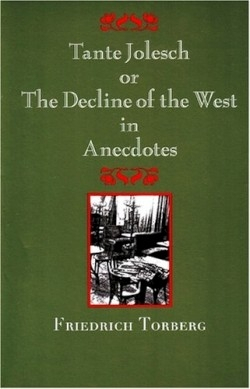
Tante Jolesch or The Decline of the West in Anecdotes
“In coffeehouses, literary schools and styles were born and discarded, and new directions in painting, music and architecture emerged.” Novelist, sportsman, and anti-Nazi journalist Friedrich Torberg (1908-1979) presents twentieth-century Vienna through anecdotes—funny, sad, gentle, rough, smart, and silly. An understated triumph of tragi-comic writing, this is the first English translation of the author’s Aunt Jolesch, based on a real person and childhood influence. He regarded this, the favorite of his writings, as a book of melancholy but not sorrow. “Melancholy can smile. Sorrow cannot. And smiling is the legacy of my tribe.”
Though he failed his high school exit exam, Torberg was already a published writer and when he was twenty-two his first novel, The Pupil Gerber (1930), became an instant bestseller. It—and he—won admiration from such luminaries as Karl Kraus and Alfred Polgar. No ivory tower intellectual, Torberg loved sports and played on a championship water polo team while living in Prague. Hakoah teams gave him more Jewish pride than his experience in synagogue, though he was also well-versed in Jewish religion and literature. There is a thrilling description of the final in which Hakoah won the Austrian soccer championship, when their goalie, partially disabled and with his arm in a sling, playing forward, managed to outwit the Sportclub defense.
Torberg’s circle in Europe and the U.S., where he was in exile during World War II, included Marlene Dietrich, Ferenc Molnár, Erich Maria Remarque, and Franz and Alma Mahler Werfel. By then a naturalized U.S. citizen, in 1951 Torberg returned to Vienna to launch a literary magazine and wrote for newspapers and radio, critical of communism and supporting democratic ideals.
By no means a catalog of anecdotes, the two dozen chapters take on music, writing, anti-Semitism, war, science, culinary arts, chess and bridge, travel, names, accents, family life, and more. Freud appears several times; in one instance he calmed a disturbed man by talking with him after psychiatrist and Nobel laureate Dr. Wagner-Juaregg caused the same patient to go wild. When Freud’s success was related to his rival, Dr. W. said, “Spare me. I’m not interested in what two nitwits discuss with each other.”
Poet and critic Clive James, in Cultural Amnesia (2007), a monumental tribute to recent Western humanism, begins in Vienna with praise for Tante Jolesch, “a peal of laughter ringing in the ruins.” Thanks to Ariadne Press, which specializes in Austrian literature and culture, anglophones can smile with Torberg through the melancholy of the just-passed century.
Disclosure: This article is not an endorsement, but a review. The publisher of this book provided free copies of the book to have their book reviewed by a professional reviewer. No fee was paid by the publisher for this review. Foreword Reviews only recommends books that we love. Foreword Magazine, Inc. is disclosing this in accordance with the Federal Trade Commission’s 16 CFR, Part 255.
